Do-It-Yourself Dating: Part 1- Pre-Dating
One of my favorite areas to counsel people is in the area of dating. It is such a meaningful and exciting time for people, yet very rarely do I think people go into dating with thought, knowledge, and intention. Dating is one of the MOST important processes in our lives, no matter what the outcome, and yet many people seem to go into dating willy nilly as if it is supposed to just be something we KNOW how to do and as if it NEVER changes over time (and we all know how it DOES change over time).
I always advise my clients to go into dating intentionally and prepared to encounter a variety of issues that will come up before and during the dating process. And it is important to note, that dating IS a process. It isn’t a destination but rather a journey.
In this first blog, I’m going to talk about the tasks that I advise my clients to do PRIOR to beginning dating (it will be helpful for anyone in the dating process too, but this is what I might discuss with someone who hasn’t yet dated and is thinking about dating).
Do Your Research
It’s a big ocean out there, and there truly ARE plenty of fish in the sea. I’m pretty sure none of us would go deep sea diving without the proper training, equipment, experience etc. While dating is much less dangerous than deep sea diving (most likely you won’t DIE dating) I’d argue that it is way more complicated. So why would we venture off into the deep sea of dating without knowledge, training, education, and all the other stuff we need to know in order to figure out how to be successful in dating????
So in this step (the pre-dating step- as mentioned above, even if you are already in a dating relationship, these recommendations are still good to follow because they will only HELP you and your relationships), I encourage my clients to do the house cleaning they need to do as well as fill-in-the-blanks that they are missing with the training and education they lack in order to come to the table as complete as they can be.
So a few suggestions:
- If you have been meaning to take care of something for a while: manage a bad habit/addiction, accept your body, get your health in check, sell an old car, invest to therapy, sell a property, divorce/break up with someone, improve a sexual issue you have etc. etc., do that BEFORE you start dating. You want to be the best version of yourself when you are out and about dating, not a work in progress, because you will be more likely to attract a work in progress if you ARE a work in progress.
- If you are angry, hold resentments, and/or have some old emotional baggage around exes, your parents, a middle school teacher who was an asshole, or have trauma that you haven’t processed, invest in therapy and work that out, or at least get started. Dating and being in a relationship requires you to be present and available, and if you are tied up into past haunts and hurts, you might not be able to be there for your partner. Don’t know a good therapist or don’t have one in your area? That’s where I come in (if you are looking for a dating coach and relationship therapist in Maine, Massachusetts, New Hampshire, New York, and Texas). Feel free to contact me at the information below.
- Educate yourself. The best way I can tell you to do that is go to a relationship therapist or dating coach AND read the following books (just think, if your car wasn’t getting you where you wanted to go, you wouldn’t just read a book and it would magically be fixed- you need a professional mechanic to help you fix it so you can get where you want to go!). The science of dating, partner selection, attachment, and everything in the world of relationships has changed over the years. Here’s what I recommend for reading:
Start with Modern Romance by Aziz Ansari and Eric Klinenberg

A comedian and sociologist team up to talk about dating, why it sucks and why it rocks, and the historical and scientific perspective on dating, relationships, and romance. My suggestion is to get the audio book, cause Aziz (Parks and Recreation, Master of None) reads it himself and he is FUNNY. Most of these books are available in Audiobook, so don’t worry non-readers.
Next in my pre-dating/dating reading list is Wired for Dating by Stan Tatkin
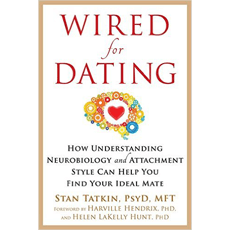
Dr. Tatkin is a marriage and family therapist who uses the science of attachment to construct a pretty digestible theory on partner selection and modern dating. For example, he talks about introducing your dates to your friends and family EARLY, so if there are any concerns or red flags that you can catch them well before you get attached to the person (the popular romance competition/strategy shows like the Bachelor and the Bachelorette make this mistake, which makes for great TV, because the last episode is usually when the contestant brings his/her choices home to the parents. WAY TOO LATE, according to Tatkin’s work, because the attachment is already there).
Some of my clients LOVE Wired for Dating. For those that don’t, I recommend Attached by Amir Levine and Rachel Heller
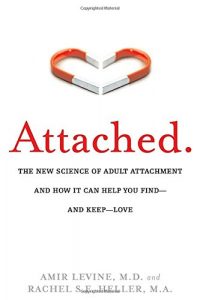
This book is GREAT on the science of adult attachment- why we attach and don’t attach to people, and how we can attach better and more productive to partners with different attachment styles. Usually my clients either like Wired for Dating OR Attached (the science minded like Attached, the relationship minded like Wired). If you are motivated, read both 🙂
My next recommendation comes with a word of caution. The author of this book IS religious (Christian), misogynistic, and pretty heterosexist. BUT, the work is so good I have to overlook these sometime major flaws, especially since his ideas and his theory is so simple, even the most emotionally shut off people really, really, really do connect with his five simple love languages. The book I like for people dating is Five Love Languages: Singles Edition by Gary Chapman although he has several other versions

He also writes a mens version, but any version will do- the premise is the same and is SO helpful to so many people, and especially I find that men really get what he writes about. It’s simple, easy to understand, and can really teach you a lot about ALL your relationships (kids, friends, pets, neighbors, co-workers, etc.).
Next on my list is taking dating to a deeper level with, Deeper Dating by Ken Page.
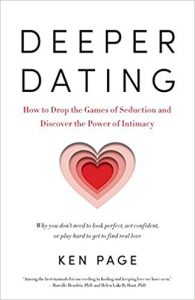
I love how this book suggests you read it and do the exercises with a learning buddy. Like many of these books- they are person growth programs because ultimately, dating is about personal growth. Learning about yourself is the number one outcome of dating, despite us thinking the opposite. And trust me, no one has to or should do it alone- friends, dating coaches, matchmakers, therapists, family- you need help. So make sure you ask for it.
Referencing above with Chapman’s work, I didn’t mean to imply that spirituality in dating wasn’t important in my above recommendations, in fact, it is one of THE most important things in relationships and dating. Having a strong SPIRITUAL (not necessarily religious) connection to a power greater than oneself is an essential component of deeply pleasure sensuality and sexuality (see my blog on Spirituality and Sexuality and Tantra Sexuality). I like this book if the Buddha dated: A Handbook for Finding Love on a Spiritual Path by Charlotte Kasl.
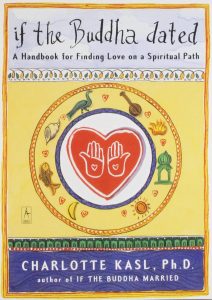
So once you complete those, if you want more information on partner selection and relationships, I like the (now classic) Getting the Love You Want by Harville Hendrix

Hendrix and his wife write this book on their popular Imago Therapy theory and have helped millions of couples communicate and connect. Even if you aren’t in a couple, this book is great at figuring out who to pick, how to communicate, and making it work.
My suggestion is treat these books like a self-study. Do the exercises, keep a journal, analyze and think, write and read, discuss it with a therapist, coach, group, and friend. A lot of these exercises I recommend to my clients without them ever picking up a book, so you’d be surprised how much you can accomplish just from what we call in the biz bibliotherapy. You get out of it what you put into it.
Okay, now that you are armed with all the knowledge in the world, you’ll be a total expert right? Not really, but at least you’ll feel like, on some level, you know what is up!
What is your GOAL of dating?
The first thing I ask my clients is “What do you want out of dating?” There are a lot reasons why people date and it is important to know why you are dating so you can target what you are looking for. Popular reasons people date are as follows:
- To meet people and/or make friends
- To practice dating
- To have fun
- To hook up/be sexual/have sex
- To get over an ex*
- To find a partner
- To get a free meal*
- To occupy time
- To learn about yourself
- Other reasons??? (Are there other reasons people date- I’m sure, but I think these cover the most common reasons)
You’ll notice I starred two of the items. I did that because these two reasons (“To get over an ex” and “To get a free meal”) I find particularly abhorrent. I know, the “rebound” might not be the WORST thing in the world, but dating is hard, and a lot of people are dating to find a partner and I feel its important that if you are going to embark on the process of dating that you are as close to the BEST VERSION OF YOURSELF as possible. It’s a common belief that often times we attract people who are at the place emotionally that we are at (if on a scale from 1-10 you feel a 4 about yourself, you are likely to attract another 4- do you want a 4?). If you are going through a break up, this is the time to heal,
and to mend, and to grow, not a time to get caught up in a new relationship that you may not be prepared to emotionally adapt to and handle the challenges. There isn’t a set time that has to elapse before you can start dating after a break up, but you should have processed the loss of the previous relationship and feel really good about yourself by the time you get back out there and dating.
The second star was about a “free meal”. I hear and see this a lot in the dating world. And it is 9.9/10 being said by women. And it is straight up exploitative. In our culture, we often explain that “chivalry is dead”, but part of what is killing it is entitled beliefs like the fact that it is acceptable to go out on a date with someone just for the fact that you are hungry and don’t want to pay for your own food. Men, who are expected to pay, can get resentful really fast if they feel like they are being used for a free meal, and that resentment is a horrible feeling amongst everyone. Don’t get me wrong, as a woman, I love when a man pays. It reminds me of my grandfather and how he used to take me out to dinner and make a big production of paying for an expensive meal and made sure I knew I was worth it. Men paying for me is directly tied to my own self-worth (whether that is a good thing or not, I don’t know). And I don’t take that for granted. I am honored to have someone spend their time AND money on me, even if it is just a coffee. Exploiting someones’ time and money is rude and I don’t approve!
So now that you have read all the books and done all the exercises (I particularly like Tatkin’s Ideal Partner Exercise and an exercise I call Red/Yellow/Green), figured out what your goal of dating is, then you should figure out how you are going to accomplish said goal. For example, if your goal of dating is to hook up, your strategy might be different than if your goal is to meet a lifelong partner.
That’ll be Part II of the blog… so you’ll just have to stay tuned! And in the meantime, if you need help, feel free to contact me at the contact information below. You don’t have to do this alone!



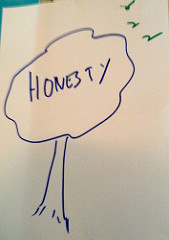

 From an evolutionary perspective, jealousy functions to guard against losing mate and/or associated resources.
From an evolutionary perspective, jealousy functions to guard against losing mate and/or associated resources. In same sex relationships, Marchand says there is not a lot of research out there but a few items to note: gay men in monogamous relationships experience more jealousy than in non-monogamous relationships and that intimate partner violence in same sex couples is more prevalent if jealousy is present.
In same sex relationships, Marchand says there is not a lot of research out there but a few items to note: gay men in monogamous relationships experience more jealousy than in non-monogamous relationships and that intimate partner violence in same sex couples is more prevalent if jealousy is present.